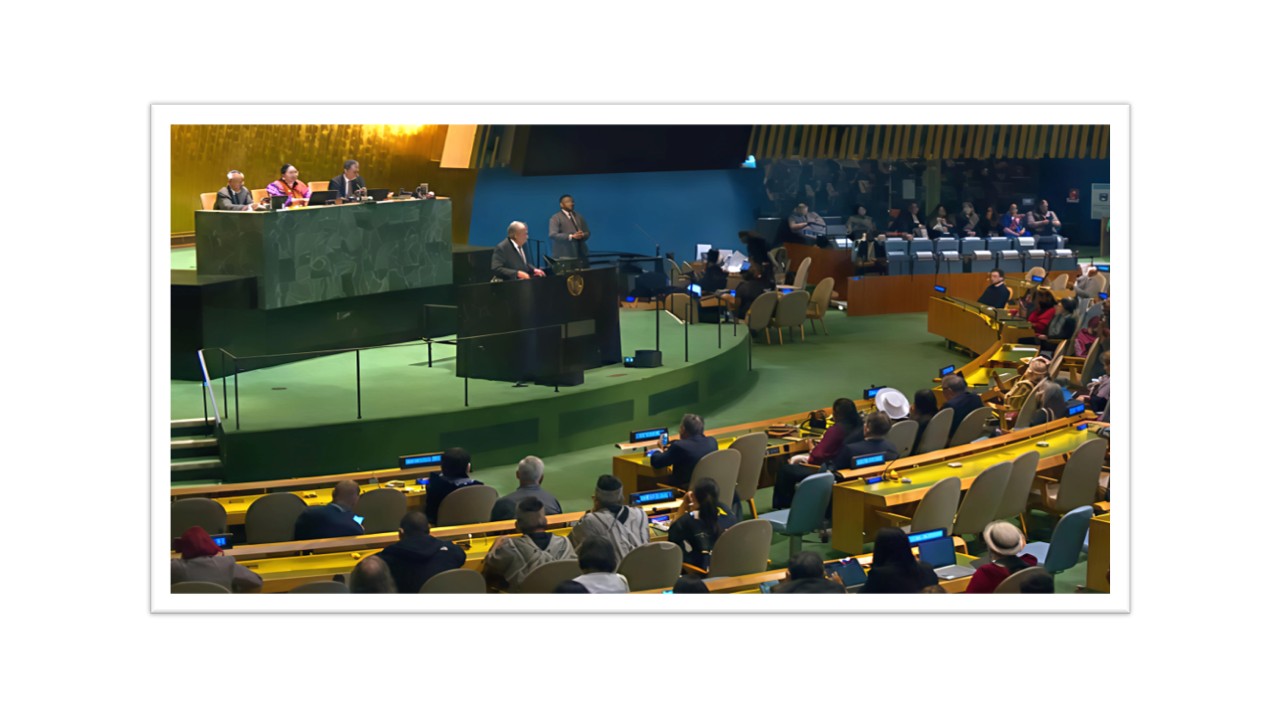
UN Chief confirms the world’s Indigenous Peoples are magnificently diverse in cultures, languages, histories, and traditions, but united by common features and common challenges and are the pre-eminent stewards of the world’s biodiversity and of the environment. The knowledge and traditional practices are leading models of conservation and sustainable use which reflect the commitment to living life in harmony with Mother Earth, and to the wellbeing and rights of future generations. The world has much to learn from the wisdom, insights and approaches, which prioritize the health of ecosystems over short-term economic gain, as we tackle the many challenges that we face such as building sustainable food systems, moving to sustainable ways of living, and to even more, we must recognize that sometimes the world does not value as it should.
Mr. Guterres emphasized the difficulties facing by indigenous peoples around the world. They are an affront to dignity and justice; and become a source of deep sorrow for him personally. Everywhere, indigenous peoples are on the frontline of climate change, pollution, and biodiversity loss – despite having done nothing to create these crises and everything to try to stop them. Eviction and illegal exploitation continue to harm the people and grossly violate their rights and so facing the marginalization, discrimination, unemployment, economic disadvantage and horrendous violence; particularly as they seek to defend their common home. They are often excluded from decisions that directly impact their own land and territories by being threaten on their ways of life and food security. For the indigenous women, they even face challenges, including barriers to political participation, economic opportunities, and essential services.
Meanwhile, a looming threat grows – the race for minerals critical to the global energy transition – a large proportion of which are located on or close to Indigenous Peoples’ territories. As demand soars, too often we see dispossession; exclusion and marginalization in decision-making; the rights of Indigenous Peoples trampled and health jeopardized, as they are denied the benefits they deserve.
UN Chief then shared his personal experience on a trip to Suriname three years ago where he had the honor of visiting the Kaliña Peoples. He witnessed how climate change is devastating their lands and destroying their way of life and have heard how mercury from illegal mining is harming Indigenous Peoples in the region, as in many others, namely, including Brazil – poisoning their water and food supplies.
UN Chief explained that eighteen years ago, the Declaration on the Rights of Indigenous Peoples laid out a blueprint for securing the survival, dignity and well-being of Indigenous Peoples everywhere. The Declaration has been used by courts, parliaments and communities to secure rights and galvanize political action; and multilateralism has delivered progress. In the past year, countries have made important new commitments. The Global Digital Compact – to build digital skills and capacities, including among Indigenous People. To accelerate the initiative …
The Pact for the Future’s call to “recognize, respect, promote and protect the rights of Indigenous Peoples, their territories, lands and ecosystems, while safeguarding their traditions, spiritual beliefs and ancestral knowledge”, and to help doing so by ensuring a seat at decision-making tables, as follow:
- At COP16 on biodiversity, countries committed to create a permanent new subsidiary body – a space for Indigenous Peoples and others to participate in decision-making on biodiversity.
- It is agreed on sharing the benefits of digital genetic information – with a portion of the new Cali Fund supporting Indigenous Peoples.
- Indigenous Peoples – particularly members of this Forum – also contributed to the work of the United Nations Panel on Critical Energy Transition Minerals.
- The Panel’s principles and recommendations are grounded in human rights, including the Declaration on the Rights of Indigenous Peoples.
The focus of this year’s session is implementing the Declaration within Member States and within the United Nations system:
- First, Strengthening the Permanent Forum:
- Member States to ensure high-level representation.
- To fortify the Trust Fund on Indigenous Issues – broadening the donor-base and increasing contributions.
- These 2(two) items are vital to enable the Forum to deliver its work, including through participation and representation at international meetings.
- Second, it is urgent that governments and institutions to ensure that the leadership, rights and needs of Indigenous Peoples are recognized and acted upon across the board.
- In a world in flux, it is particularly important that Governments are alert to the impacts on Indigenous Peoples. Governments must honor their obligations in the Declaration on the Rights of Indigenous Peoples – without delay.
- To bring Indigenous Peoples, particularly women, into all forms of decision-making, and support political participation.
- Third, International Finance providers should make Indigenous Peoples a key consideration – so that finance flows to their self-determined priorities and projects are including interactions.
- Fourth, Countries, companies and more, to work with United Nations to deliver on all the recommendations of the Panel on Critical Energy Transition Minerals.
- To launch the High-Level Expert Advisory Group to accelerate action on benefit sharing, value addition, and fair trade – and the needs and input of Indigenous communities will be the key.
Related Link:
Indigenous Activist from Greenland | United Nations
Indigenous Peoples: On the frontline of climate change & biodiversity loss UN Chief | United Nations
Indigenous Peoples’ rights are non-negotiable | United Nations










